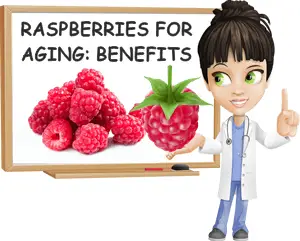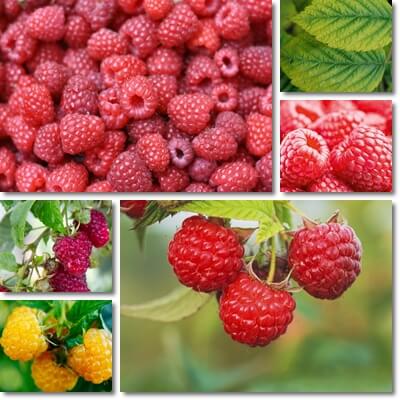Raspberries are the last food to come to mind when you think of antiaging foods. But raspberries are one of the top anti aging foods to eat according to research.
Studies have identified important antiaging constituents in raspberry fruit with photoprotective, anti-inflammatory, antioxidant, neuroprotective, anti-cancer and longevity-promoting effects that rival those of highly popular antiaging foods.
According to available data, select biologically active constituents in raspberries exert multi-level antiaging activities promoting longevity and a more youthful appearance via the modulation of a range of physical health markers.
To exemplify, constituents in raspberries have been found to exert neuroprotective effects that counteract brain aging and cognitive decline contributing to reduced risks of aging-related neurodegenerative diseases such as dementia.

At the same time, topical formulations with raspberry extract display measurable solar protection factor effects and provide photoprotective benefits for the skin, as well as help improve skin elasticity which contributes to a more youthful appearance, namely fewer fine lines and wrinkles. And these are just a few of the antiaging benefits of raspberries.
What are the antiaging benefits of raspberries?
1- Improve skin elasticity for a more youthful appearance and fewer wrinkles
According to research, ‘normal skin contains high concentrations of vitamin C, with levels comparable to other body tissues and well above [blood] plasma concentrations, suggesting active accumulation from the circulation’ (study). Vitamin C is needed to stimulate the production of collagen in the skin for skin strength and elasticity, and to stabilize collagen fibers.
Studies show the dermis, which is the inner layer of the skin, is made up of around 75% collagen per dry weight. Which implies that the skin relies heavily on vitamin C to preserve its structure and elasticity. A low intake means saggy skin, fine lines and wrinkles due to vitamin C deficiency impairing production of collagen.
Raspberries are a reliable source of vitamin C as in they have a good content and are a readily available food, in season for months at a time, and accessible price wise, not to mention easy to grow. Including them in your diet can help you meet your daily requirements and enjoy benefits for skin such as improved skin elasticity for a more youthful appearance with fewer fine lines and wrinkles.
How much vitamin C in raspberries?
On average, a serving of 100 grams of raw, fresh raspberries has 26 milligrams of vitamin C. The average adult needs a minimum of 90 milligrams of vitamin C per day, every day. That means that one 100-gram serving of fresh raspberries can get you close to 29% of your total daily vitamin C values which is a good amount.

2- Raspberries hold benefits for psychomotor function and mobility
Aging is typically accompanied by the gradual loss of psychomotor function. According to research, ‘berry supplementation improves the age-related declines in balance, muscle strength, and coordination that often lead to falls, even when initiated later in life.’
In an animal study, rats fed 1% to 2% raspberry diets exhibited significant improvement in their psychomotor function and subsequently also quality of life. Effects were most prominent in poor performers which has lead researchers to conclude that ‘increased raspberry consumption may reduce fall risk, extend independence, and improve quality of life in the aging population.’
In part, the benefits are owed to the content of vitamin C in raspberries. Vitamin C is responsible for the synthesis of collagen and stabilizing collagen fibers; collagen is what provides structure to skin, but also makes up tendons, ligaments, cartilage, bone, teeth, and muscles on which psychomotor function is reliant.
3- Exert photoprotective effects and counteract sun damage to skin
Solar damage induces aging in the form of saggy skin, fine lines, early wrinkles, dryness and scaliness, skin dullness, uneven skin tone, sun spots and other forms of hyperpigmentation, as well as causes cell mutations conducive to skin cancer development.
Studies have found raspberries to exert measurable photoprotective effects, providing solar protection benefits both from within and from the outside. Two of the most significant sources of the photoprotective benefits of raspberries are antioxidants in the fruit: vitamin C and flavonoids such as pigmented anthocyanins.
When used in topical formulations, pigmented anthocyanin antioxidants in raspberries actively express solar protective effects with a solar protection factor of a little over 37 (source). Not just this, but topical formulations with raspberry can introduce vitamin C to the skin for added protection against sun damage.
Vitamin C applied to the skin scavenges harmful free radical molecules and contains cell damage caused by exposure to UVB and UVA radiation from sunlight. It further exerts reparative effects, and activates detoxifying enzymatic processes with the purpose of clearing out toxic metabolites.
Moreover, when the skin takes in vitamin C topically (e.g. applying a crushed raspberries mask to the face), there is a boost in the production of collagen for better skin elasticity which can improve the appearance of fine lines and wrinkles. Vitamin C that can be made available to the skin topically can further reduce the production of melanin, which is naturally triggered by sunlight exposure, with benefits for skin hyperpigmentation.
And it’s not just raspberries themselves that have photoprotective and antiaging benefits, but also raspberry leaf. A split-face, randomized controlled trial on the anti-aging and brightening effects of a topical treatment containing vitamin C, vitamin E, and raspberry leaf cell culture extract observed that ‘skin color, elasticity, and radiance were significantly improved. The smoothness, scaliness, and wrinkles were also revealed significant improvement’ with only mild and reversible adverse reactions (source).

4- Have lifespan-extending effects for an increase in longevity
There is a growing body of research that identifies raspberries as an antiaging food capable of producing lifespan-extending effects and increasing longevity. Raspberries contain ellagitannins, naturally occurring constituents that get metabolized to compounds with an antiaging action called urolithins.
Urolithins, which can be obtained by simply eating raspberries, have been shown to induce mitophagy and prolong lifespan in C. elegans worms, as well as improve muscle function in rodents, with lifespan-extending benefits (source).
Mitochondria are the engines inside our cells, cell parts that produce the energy needed to fuel life-sustaining processes and essentially support life. Mitochondria need regular replacing, especially if they get damaged or become defective.
The process is called mitophagy and consists of recycling the cell parts. But as we age, mitophagy slows down which becomes a source of aging-related health problems such as lengthier recovery times following disease, slower wound healing and even disease.
Urolithins such as Urolithin A, which can be obtained from eating raspberries, rejuvenate the mitophagy process which can translated into increased lifespan. In Caenorhabditis elegans, a very short-lived roundworm used as a model organism for research into aging, Urolithin A ‘prevented the accumulation of dysfunctional mitochondria with age and extended lifespan’ of the organism by up 45% on average.
In another study, C. elegans lifespan was increased by 13.6%, 22.9% and 29.7%, respectively, following supplementation with raspberry extract; lifespan-extending effects were observed to be dose-dependent (study).
Research observed that Urolithin A also ‘prolonged normal activity during aging’, ‘including mobility and pharyngeal pumping, while maintaining mitochondrial respiratory capacity’. ‘These effects translated to rodents, where Urolithin A improved exercise capacity in two different mouse models of age-related decline of muscle function, as well as in young rats.’
There are also studies highlighting the benefits of Urolithin A for cellular health in humans (source), with preclinical studies showing how Urolithin A can potentially be used to protect against ‘aging and age-related conditions affecting muscle, brain, joints, and other organs’ (source).
The findings highlight the potential applications of Urolithin A in strategies to improve functions and behaviors that degrade with aging, such as muscle function and mobility, and may also indicate the potential for lifespan-extending benefits via mitophagy pathways.
5- Raspberries have neuroprotective effects
Did you know that raspberries are good for the brain and nervous system? Studies report Urolithin A that can be obtained from ellagitannins in raspberries has neuroprotective benefits. Urolithin A was found to activate ‘mitophagy in mammal cells and Caenorhabditis elegans’, a roundworm and model organism for antiaging research.
In mouse models with induced brain infarct and associated neurological deficit scores, Urolithin A alleviated injury in neurons, and reduced ischemic brain injury (source). The neuroprotective effects were found to be owed to Urolithin A activating autophagy, a process of self-digestion by means of which defective mitochondria in neurons, essentially cell particles, are cleared out to prevent buildup and associated side effects.
The neuroprotective and neuro-regenerative effects of raspberries can translate into lifespan-extending benefits, increasing longevity by preventing and reducing the impact of brain ischemic events.
6- Benefits for aging-related neurodegenerative diseases and associated behavioral dysfunction such as memory impairment
Eating berries such as raspberries can help slow down the progression of behavioral dysfunction associated neurodegenerative diseases such as Parkinson’s, Alzheimer’s and other forms of dementia whose incidence grows with age.
Studies exploring the benefits of Urolithin A on the brain and nervous system have revealed the compound has ‘an ameliorative effect on cognitive impairment and brain aging’ via a neuroprotective action (source). Essentially, Urolithin A from raspberries can help slow down brain aging, and delay aging-related cognitive decline in the form of neurodegenerative diseases as a result.
In animal studies, Urolithin A was concluded to improve cognitive impairment, prevent nerve cell death and enhance neurogenesis which can translate into benefits for memory impairment due to cognitive decline associated with aging (study).
Research further shows ‘bioaccessible (poly)phenol metabolites from raspberry protect neural cells from oxidative stress’ via an antioxidant action. Oxidative stress to nerve cells causes damage and neuroinflammation which are elements of ‘the neurodegeneration process inherent to several aging dysfunctions’ (study).
Even at low concentrations, raspberry extract and fraction ‘protected neuronal and microglia cells against (…) induced oxidative stress and (…) induced inflammation’, indicating that ‘raspberry polyphenols may present a dietary route to the (..) amelioration of neurodegenerative-related dysfunctions’.
Moreover, resveratrol in raspberries ‘exerts advantageous effects on aging and various other age-related chronic diseases in particular Alzheimer’s disease’ via free radical-scavenging, chelating agent, and anti-inflammatory activities.
Raspberries further have an antidiabetic action which translates into benefits for the nervous system and cognition. High blood sugar in diabetes causes pathological changes at the level o the nervous system such as ‘impaired neuronal integrity, neurodegeneration, and cognitive impairment’ (source). By helping with better blood sugar control by means of a low glycemic index and low calorie content, raspberries indirectly combat aging-related neurodegenerative diseases and associated behavioral dysfunction.
7- Raspberries contain resveratrol with chelating, anti-inflammatory and free radical scavenging activities
You can find resveratrol not just in grapes and wine, but also in berries such as blackberries and raspberries, especially, red and purple raspberries and black raspberries. Research reveals ‘resveratrol exerts advantageous effects on aging and various other age-related chronic diseases in particular Alzheimer’s disease, cancer, and diabetes, etc.’ (source). Including plenty of resveratrol-rich foods in your diet can help ward off chronic disease and potentially contribute with lifespan-extending effects as a result.
8- Raspberries have an anti-obesity and antidiabetic action
One of the many ways raspberries promote longevity is via their anti-obesity and antidiabetic action. Both excess body weight and diabetes affect health markers (e.g. cardiovascular health, vision, wound repair, infection risks, disease recovery time) and cause a multi-level decline in health that can translate into reduced lifespan.
For one, raspberries qualify as an anti-obesity food whose natural makeup makes them good for weight loss and weight management. With only 53 kcal (kilocalories, calories) per 100 grams of fruit, an impressive 6.5 grams of dietary fiber, under 0.7% fat and over 85% water, raspberries are a good food for losing weight. Losing excess weight and reaching a normal weight can actively reverse type 2 diabetes and improve all aspects of health affected by the disease, including lifespan.
Moreover, Urolithin A, obtained by the gut conversion of ellagitannins from raspberries, enhances the thermogenesis of fat tissue which translates into anti-obesity effects. Research confirms ‘obesity leads to multiple health problems, including diabetes, fatty liver, and even cancer’ which all have a significant impact on lifespan.
Animal studies show treatment with Urolithin A ‘prevents diet-induced obesity and metabolic dysfunctions in mice without causing adverse effects’ via thermogenesis which is the physiological production of heat, resulting in increased energy consumption favoring weight loss (study).
Not just this, but eating raspberries holds benefits for the activity of beta cells in the pancreas. Treatment of diabetic mice with Urolithin A ‘restored cell viability’ in pancreatic cells by activating autophagy, reducing cell death (study). This translates into a protective antidiabetic effect with potential benefits for longevity.
Raspberries are further a low glycemic food with limited effects on blood sugar metabolism, when consumed reasonably of course, and have a high content of dietary fiber to help with blood sugar control.
9- Raspberries are good for the heart
Cardiovascular health is one of the first to deteriorate with age. Whether it’s because of poor dietary and lifestyle habits acquired with time or sedentarism and associated weight gain derived from the natural loss of muscle function and mobility that occur with age, cardiovascular health is affected as we age.
Raspberries are low in calories and low glycemic, helping with weight management and blood sugar control for better cardiovascular health. Not just this, but the fruit is rich in antioxidants which combat lipid oxidation and further contribute to maintaining good cardiovascular health.
Raspberries also contain resveratrol, an antioxidant whose presence is normally associated with grapes and wine. A growing body of evidence on the health effects of resveratrol indicates it has important anti-aging and cardiovascular benefits delivered primarily via its antioxidant function.
Resveratrol in raspberries helps limit and counteract lipid peroxidation and exerts free radical scavenging functions that advance vascular health. Not just this, but ‘it was found to prolong lifespan by 70% in Saccharomyces cerevisiae, a typical model for aging studies’ (source).
The very good content of dietary fiber in raspberries further helps balance cholesterol levels, contributing to a healthier blood cholesterol profile by lowering LDL, dubbed as bad cholesterol, with possible lifespan-extending effects.
Lastly, animal studies have revealed that supplementing with berries can actively and ‘significantly decrease plaque accumulation’ on the inside of artery walls, a major cardiovascular complication and marker of cardiovascular disease in the form of atherosclerosis. Atherosclerosis can be a source of cardiovascular events that can severely reduce lifespan.
